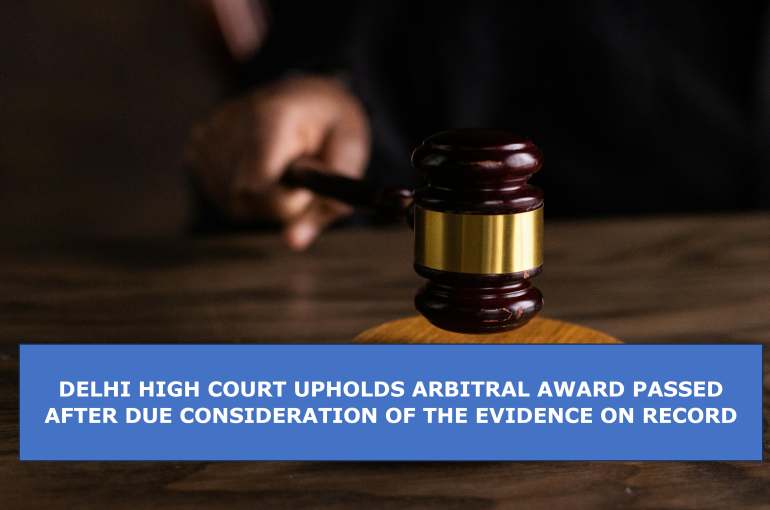DELHI HIGH COURT UPHOLDS ARBITRAL AWARD PASSED AFTER DUE CONSIDERATION OF THE EVIDENCE ON RECORD
A single-Judge Bench of the Hon’ble Delhi High Court comprising of Justice Neena Bansal Krishna passed a Judgment dated 29-05-2024 in the matter of Govt of NCT of Delhi vs. M/S DSC Limited, Original Miscellaneous Petition O.M.P. (COMM) 331/2020 & I.A. 10114/2024 and observed that the Arbitrator’s interpretation of the contract, particularly regarding delays and extensions, must be reasonable and based on evidence. Further, the Court emphasised that judicial interference is limited to ensuring that the award is not perverse, irrational, or patently illegal. Moreover, the Court reiterated that the Arbitrator’s findings must align with the fundamental policy of Indian law.
FACTS:
i) That the Petition mentioned above was filed before the High Court of Delhi (High Court) by the Flyover Project Division F-131, Public Works Department (PWD), Delhi (Petitioner) against the M/s DSC Ltd (Respondent), under Section 34 of the Arbitration and Conciliation Act, 1996 (“Act, 1996“) (Application for setting aside arbitral awards). This Petition challenges the Award dated 24.09.2014, which upheld the Respondent’s declaration regarding the work completion date as 22.09.2010.
ii) The Petitioner awarded a Contract to the Respondent for the construction of an Elevated Road over Barapulla Nalla in Delhi, with a commencement date of 11.09.2008 and an original completion date of 10.03.2010, later revised to 01.10.2010. The Respondent sought a declaration that the work was completed by 22.09.2010, but the Petitioner contended that it was completed by 25.11.2011 and thereby, levied liquidated damages @ 10% for the delay in completion of work. Further, the Petitioner issued a Notice for encashment of Bank Guarantee.
iii) Aggrieved by the decision of the Petitioner, the Respondent filed an Arbitration Petition under Section 9 of the Act, 1996 (Interim measures, etc., by Court), and the Arbitrator determined the completion date as 22.09.2010, thereby, concluding that there was no delay by the Respondent and, therefore, the Petitioner was not entitled to levy liquidated damages.
iv) The Petitioner challenged the Arbitrator’s Award under Section 34 of the Act, 1996 before the Hon’ble Delhi High Court, asserting that the Arbitrator’s conclusions were against the contract terms and the evidence. Further, the Arbitrator did not conduct the proceedings fairly and transparently, which prejudiced the Petitioner’s rights. The Petitioner claimed that the Award did not comply with the provisions of law and hence, should be set aside.
ARBITRATOR’S OBSERVATION:
1) The Arbitrator observed that the construction work was completed on 22.09.2010. This was based on the evidence presented, including the fact that the Respondent had handed over the project to the Petitioner on this date.
2) The Arbitrator found that the delays cited by the Petitioner were not attributable to the Respondent. The extensions of time granted were viewed as exonerations of the Respondent from the responsibility for these delays.
3) Since the Arbitrator concluded that there was no delay on the part of the Respondent, it was held that the Petitioner was not entitled to impose liquidated damages. The reasoning was that without a delay attributable to the Respondent, the imposition of liquidated damages was unjustified.
4) The Arbitrator ensured that both Parties were given a fair opportunity to present their case. This included considering all submissions, evidence, and arguments from both sides before reaching a decision.
5) The Arbitrator closely examined the terms of the contract and the evidence provided, including correspondence and documentation related to the project timeline and extensions. This thorough examination supported the conclusion that the work was completed in a timely manner as per the revised schedule.
HIGH COURT:
Aggrieved, by the Award dated 24.09.2014 passed by the Ld. Arbitrator, the Petitioner filed a Petition bearing O.M.P (COMM) 331/2020 before the Hon’ble High Court of Delhi.
ISSUE:
Whether the Award warranted interference on grounds of patent illegality or violation of the fundamental policy of Indian law.
OBSERVATION:
a) The Delhi High Court’s observation centred on a meticulous analysis of contractual obligations and the allocation of responsibility for project delays. The Bench emphasized the critical importance of interpreting contractual terms accurately to ascertain each Party’s obligations. The Court scrutinized the evidence presented, particularly focusing on the completion date of the construction project, which was pivotal in determining liability for delays.
b) Further, the Court found that the delays cited by the Petitioner were not attributable to the Respondent. The High Court highlighted the significance of extensions granted during the project timeline, viewing them as exonerations of the Respondent from liability for the delays. Consequently, the Court concluded that the Petitioner was not entitled to impose liquidated damages, as no delay attributable to the Respondent was established.
c) Furthermore, the Court’s observation emphasized the need for fairness in arbitral proceedings. The Bench ensured that both Parties were given ample opportunity to present their case comprehensively, considering all submissions, evidence, and arguments before reaching a decision. This commitment to procedural fairness underscores the Court’s dedication to upholding legal integrity and ensuring just outcomes in arbitration matters.
d) Overall, the Delhi High Court’s observation underscored the importance of meticulous examination of contractual terms, fair adjudication of responsibilities for delays, and adherence to legal principles in arbitral proceedings. It provided valuable insights into the Court’s approach to resolving complex contractual disputes, highlighting the significance of procedural fairness and legal integrity in achieving just outcomes.
CONCLUSION:
Based on the above-mentioned facts, the Delhi High Court dismissed the Petition and held that the Ld. Arbitrator after due consideration of the evidence on record, had given a well-reasoned Award which does not merit any interference. Further, the Hon’ble High Court highlighted the significance of contract interpretation, fairness in arbitration, and upholding of legal integrity.
Sakshi Raghuvanshi
Senior Legal Associate
The Indian Lawyer





































Leave a Reply